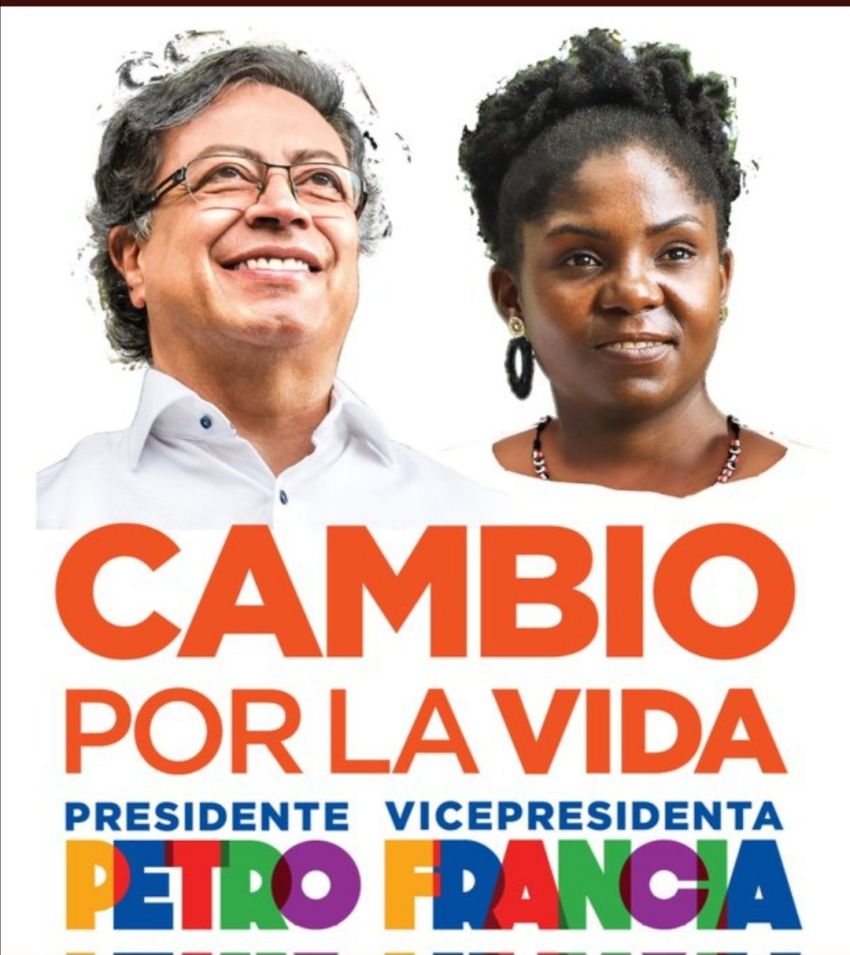
Colombia held its general elections on May 29, with six candidates vying for the presidency of the country. With 96.2% of pre-counting completed — not the official result — it is clear that a second round will take place.
Gustavo Petro and Francia Márquez (Historic Pact) obtained 40.3% of the vote, with 8.3 million votes, followed by Rodolfo Hernández and Marelen Castillo (Anti-Corruption League) with 5.8 million votes, equivalent to 28.1%.
There was a 47% voter turnout, with more than 18 million votes cast, as voting in Colombia is optional. The participation in this electoral process surpassed the 2014 presidential election, which had about a 40% turnout. The departments with the highest turnout were Cundinamarca, where the Capital District is located, with a 58% turnout; Bolivar with 58% and Quindío with 55%.
Despite appearing third in the opinion polls, Hernández surprised and opened a lead of almost five percentage points over Fico Gutiérrez (Team for Colombia), who was considered the favorite to run in the second round.
With the slogan “don’t steal, don’t lie, don’t betray”, Hernández bases his campaign on the fight against corruption, as the name of the alliance suggests, and on the fact that they are an alternative to the “old politics”. He is a civil engineer and owner of HG Construtora. With a strong discourse against insurgent movements, Rodolfo Hernández has declared that he has had family members kidnapped in the past by the Revolutionary Armed Forces of Colombia and the National Liberation Army.
Despite basing his campaign on the fight against corruption, Hernández will face trial on July 21, accused of corruption during his time as mayor of the city of Bucaramanga.
Petro and Francia, who took the first place in a landslide, propose to fight hunger, reactivate peace negotiations with insurgent groups, investigate cases of violence against social leaders and peasants, recognise the land rights of indigenous peoples and the rights of quilombolas (Afro-Colombians), as well as diversify the country’s economic base with a perspective of sustainable development.
According to the Ministry of Foreign Affairs’ initial report, 190,000 people voted abroad.
The current results are based on the quick count carried out by the electoral authority, on top of the previous data transmitted by the electoral juries in each of the 102,000 polling stations located across the 32 departments and the capital district. Official results, however, are expected to be released during the week.
Some 400 people are following the election in 27 election observation missions.
In the first bulletin, the Electoral Observation Mission (EOM) registered 119 irregularities, such as vote buying or pressuring a voter.
In addition, 62% of the observed polling stations did not have biometric recognition machines installed, 36% of the electoral zones lacked jurors and 22% of the polling stations did not have electoral witnesses present.
Defense minister Diego Molano assured the media that the day passed smoothly, despite the fact that three explosions were registered in the departments of Caquetá and Guaviare. According to Molano, these were isolated events not related to the election.
Interior minister Daniel Palacios said he had received 584 reports of electoral irregularities, 506 within the country and the other cases registered in the United States, Canada and Spain. “98 were for pressuring the voter, 81 for political intervention by public servants and 50 for surveillance of the electoral process,” he said.
Because of the irregularities, two people were arrested in the departments of Nariño and Cauca. Electoral authorties also had to change the voting location of 31 polling stations due to weather issues.
“The process was quite fast. We hope that change will come, because we are already tired, especially the middle and lower classes. The state is not functioning as it should,” said Edgar Malagon, a voter in the Teusaquillo area of the Colombian capital.
Martha Rocio, a voter in the central region of Bogotá also says she hopes for a change “for the young people, that they have jobs, that they can study, that’s why I come to vote.
[Abridged from Peoples Dispatch. This piece was first published in Brasil de Fato. The second round run-off will take place on June 19.]